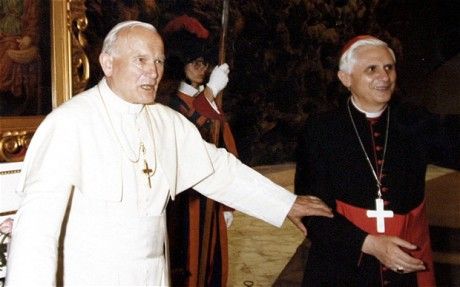
All Catholics are “obliged to oppose the legal recognition of homosexual unions” and where such unions are given the legal status and rights that belong to marriage, “clear and emphatic opposition is a duty,” said St. Pope John Paul II in a 2003 letter issued by then-Cardinal Joseph Ratzinger, the current Pope Emeritus Benedict XVI. Catholics in general have a duty to clearly oppose homosexual marriage.
In addition to Catholics in general, a Catholic politician “has a moral duty to express his opposition clearly and publicly and to vote against” such unions, and if it already is the law, the politician still must oppose it and has a “duty to witness to the truth,” said St. Pope John Paul II and Emeritus Pope Benedict XVI.
“The common good requires that laws recognize, promote and protect marriage as the basis of the family, the primary unit of society,” said St. Pope John Paul II and Cardinal Ratzinger (Pope Benedict XVI) in the March 2003 document titled " Considerations Regarding Proposals to Give Legal Recognition to Unions Between Homosexual Persons". Click here to read "the document" in full.
“Legal recognition of homosexual unions or placing them on the same level as marriage would mean not only the approval of deviant behavior, with the consequence of making it a model in present-day society, but would also obscure basic values which belong to the common inheritance of humanity,” the letter states.
“The Church cannot fail to defend these values, for the good of men and women and for the good of society itself,” reads the letter. St. Pope John Paul II approved the document on March 28, 2003 and ordered its publication. The 'document' was subsequently released through the office of the Congregation for the Doctrine of the Faith, then-headed by Card. Ratzinger (Pope Benedict), on June 3, 2003.
The letter begins by explaining that “homosexuality is a troubling moral and social phenomenon,” and especially so where gay unions are given legal recognition and include “the possibility of adopting children.”
The Considerations, it states, “provide arguments drawn from reason which could be used by Bishops in preparing more specific interventions” for “protecting and promoting the dignity of marriage, the foundation of the family, and the stability of society,” of which marriage between one man and one woman “is a constitutive element.”
“No ideology can erase from the human spirit the certainty that marriage exists solely between a man and a woman,” say St. John Paul II and Pope Benedict.
“Men and women are equal as persons and complementary as male and female,” they wrote. Through marriage, a man and woman use the “sexual faculty” to become one flesh and potentially produce children.
“That is why a man leaves his father and mother and clings to his wife and they become one flesh” (Gen 2:24), reads the letter, adding that God “blessed the man and the woman with the words ‘Be fruitful and multiply’ (Gen 1:28). Therefore, in the Creator's plan, sexual complementarity and fruitfulness belong to the very nature of marriage.”
Given the natural complementarity between man and woman and the procreative potential of their union through marriage, “[t]here are absolutely no grounds for considering homosexual unions to be in any way similar or even remotely analogous to God's plan for marriage and family.”
“Marriage is holy, while homosexual acts go against the natural moral law,” states the letter. “Homosexual acts ‘close the sexual act to the gift of life. They do not proceed from a genuine affective and sexual complementarity. Under no circumstances can they be approved.’”
Because homosexual unions lack the biological and anthropological elements of marriage and family, reason alone dictates that they cannot be given “legal recognition,” reads the Considerations. “Such unions are not able to contribute in a proper way to the procreation and survival of the human race.”
“Society owes its continued survival to the family, founded on marriage,” reads the letter.
Thus, for “those situations where homosexual unions have been legally recognized or have been given the legal status and rights belonging to marriage, clear and emphatic opposition is a duty,” stated the two popes.
“One must refrain from any kind of formal cooperation in the enactment or application of such gravely unjust laws and, as far as possible, from material cooperation on the level of their application,” they said. “In this area, everyone can exercise the right to conscientious objection.”
As for Catholic politicians, they also are “obliged” in a “particular way” to oppose homosexual unions or homosexual marriages.
“When legislation in favor of the recognition of homosexual unions is proposed for the first time in a legislative assembly, the Catholic law-maker has a moral duty to express his opposition clearly and publicly and to vote against it,” states the letter.
“To vote in favor of a law so harmful to the common good is gravely immoral.”
“When legislation in favor of the recognition of homosexual unions is already in force, the Catholic politician must oppose it in the ways that are possible for him and make his opposition known; it is his duty to witness to the truth,” stated Pope Benedict and St. Pope John Paul II.
In 2010, Cardinal Bergoglio (the current Pope Francis) said that a proposal to legalize same-sex marriage in Argentina was “destructive of the plan of God” and was “a ‘move’ of the Father of Lies" who wishes to confuse and deceive the children of God.”
The “Father of Lies” reference comes from the Gospel of John (8:44), where Jesus refers to Satan as “a liar and the father of lies.”
Source- CNS News

Comments





